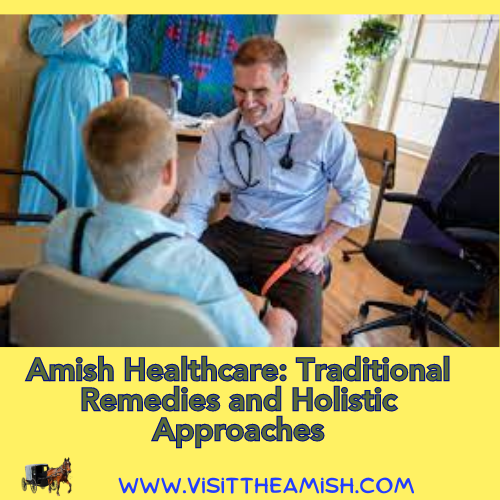Amish Healthcare: Traditional Remedies and Holistic Approaches
Amish Healthcare: Traditional Remedies and Holistic Approaches
Amish have many strategies for dealing with modern health care. Their community ties run deep while remaining wary about providing personal information to outside healthcare providers.
They may allow a hospital bill to be paid in monthly installments and also donate funds to support the Clinic for Special Children in Strasburg, Pennsylvania which treats inherited diseases while furthering genetic research.
Traditional Remedies
The Amish are descended from Anabaptists, a movement founded during Europe’s Radical Reformation in sixteenth-century. While not opposed to medical treatment, Amish are more inclined to turn towards traditional remedies like folk remedies or herbal teas for healing than advanced procedures like heart transplants or lifesaving procedures – trusting God instead as their ultimate healer.
Many Amish live a simpler lifestyle, using horse-drawn buggies and living without electricity in their homes. They avoid modern conveniences like TV and cell phones in order to preserve traditional values while minimizing exposure to mass media.
Nursing professionals can support Amish patients by permitting family members to visit during hospital stays, and by offering care that is culturally sensitive. For instance, nurses could utilize Burn and Wound Ointment from Holistic Acres LLC of Newcomerstown Ohio which has been clinically proven to reduce infections and speed healing as a wound care solution.
Health care professionals may also find that Amish patients feel more at ease when in the presence of familiar faces, and can reduce anxiety by speaking Pennsylvania Dutch – the dialect spoken by Amish people. Furthermore, taking time to explain costs before performing procedures often makes Amish individuals more open to discussing concerns and accepting recommended treatments.
Holistic Approaches
Amish communities pride themselves on helping each other. When members become sick and can no longer afford their high medical bills, they turn to family for support based on Galatians 6:2 (“Bear one another’s burdens”). Furthermore, churches encourage members to donate when they cannot afford it themselves (Lehman, 2013).
While Amish aren’t opposed to modern medicine, they take a unique approach when it comes to treating ailments holistically and seeking alternative forms of healing like herbal tea, massage therapy and chiropractic care.
Amish have turned to alternative medicine as one way of managing their spiraling health costs, but they also seek help from outside sources like Lancaster General Hospital who have devised an affordable plan that allows Amish patients to pay their hospital bills in installments over time.
Unfortunately, such programs often struggle to overcome resistance from some Amish individuals who perceive them as attempts by outside institutions to disrupt the church’s perpetually fragile peace. Health care professionals working with Amish must establish trust and build a rapport before broaching sensitive topics like family matters, mental illness or sexual activity – a warm handshake, quiet introduction and willingness to speak Pennsylvania Dutch can facilitate this process.
Preventative Care
As is common with other groups, Amish rely heavily on preventative health measures and prayer as natural treatments to promote wellness and decrease disease risks. Their religious approach emphasizes these practices over other options.
Many Amish also seek unconventional treatments by including vitamin supplements, homeopathic remedies and various healing herbs in their health regimens. Reflexologists and chiropractors may also be sought out regularly; in addition, some make frequent trips to Mexico clinics offering cure-all solutions not readily available here (Armer & Radina 2006).
As with other Americans, Amish individuals face medical bills they need to pay. Their religious beliefs prevent them from accepting government funding sources like Medicare and Medicaid as a source of payment; as such they usually opt out of purchasing private insurance policies that could cover them such as Crigler-Najjar Syndrome that often is not covered (Reiter et al 2009).
Researchers and practitioners face unique challenges in meeting Amish needs and reducing access barriers. Amish women may be wary to engage in psycho-social interventions such as counseling due to fears that doing so would alter their culture, leading them to employ cultural strategies designed to meet intervention needs while limiting potential disapproval by co-religionists or unrest among church communities. McBride & Gesink (2018) explore one such strategy wherein a local doctor used an Amish cultural approach in order to reduce barriers for women seeking care.

Alternative Medicine
Even though many Amish do not visit doctors and hospitals for their health needs, they do still prioritize it. Their core value of “caring for one another” (Galatians 6:2 King James Version) compel them to help one another when someone falls sick, giving donations in order to cover medical bills (Brewer & Bonalumi 1995). These practices align with their belief that God alone is capable of healing; modern medicine does not always suffice (Brewer & Bonalumi 1995).
Amish women utilize alternative treatment methods to stay well and promote overall wellbeing, such as herbal remedies, chiropractic care and pressure point therapies as a form of preventative medicine. Massage therapists, acupuncturists or chiropractors may be hired in order to treat chronic pain issues.
Amish families seeking treatment for serious conditions often consult Western physicians; however, due to cost concerns most cannot afford Western healthcare – hospital bills have even been known to overwhelm some Amish households and threaten their way of life (Clinic for Special Children, Strasburg PA). Therefore, to address this situation they created the Clinic for Special Children which helps identify and treat inherited conditions that traditional practitioners might miss.
To help reduce these expenses, the clinic offers a sliding scale and accepts monthly payments from Amish patients. Furthermore, local hospitals have engaged in cash discount negotiations which enable the Amish to avoid high medical fees while staying true to their beliefs.

